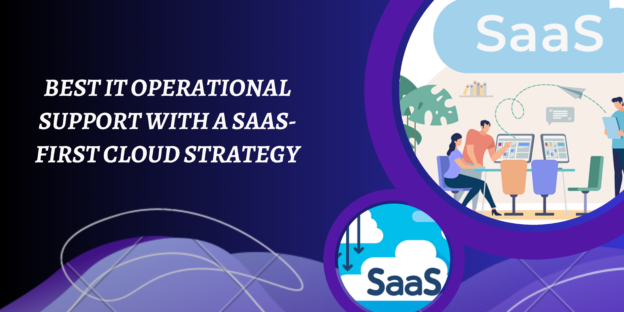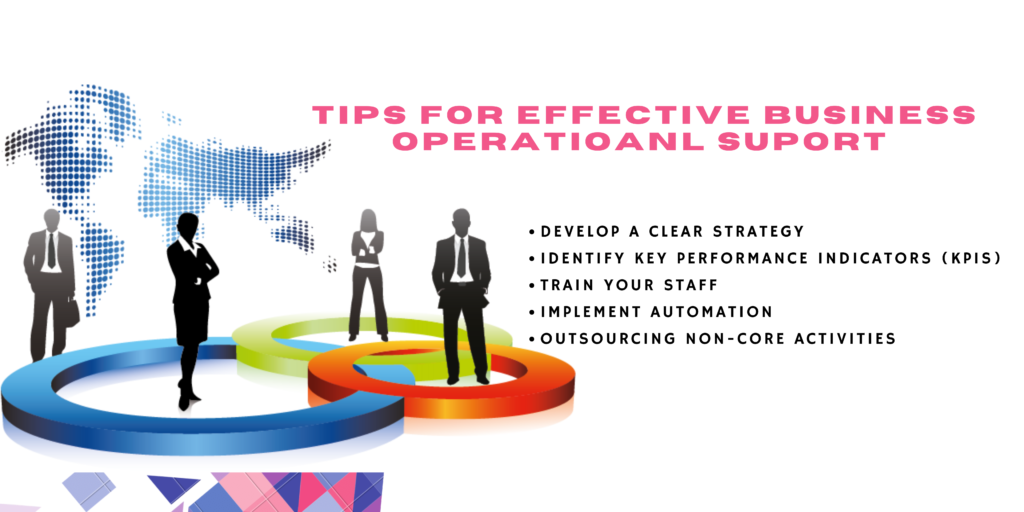The world of IT is constantly evolving, and businesses rely increasingly on technology to keep them competitive in their respective industries. With this reliance on technology comes the need for IT operational support services to ensure systems run smoothly and effectively. This blog will explore what IT operational support is, its importance in business, cloud-first strategies, and the impact of a SaaS-first cloud strategy on operational support services. We will highlight the best operational support in business that can be implemented with a SaaS-first cloud strategy.
What is IT Operational Support?
In today’s digital age, IT operational support has become an integral part of any business that relies on technology. IT operational support refers to the processes and activities that are performed to ensure the smooth functioning of IT systems and infrastructure.
IT operational support encompasses various activities, such as monitoring, maintenance, troubleshooting, and incident management. These activities are carried out to prevent or resolve issues that may arise in IT systems and infrastructure. The ultimate goal of an operational support services company is to ensure that IT services are available to end users and that business operations are not disrupted.
Effective IT operational support requires a combination of technical expertise, tools, and processes. IT professionals specializing in operational support must deeply understand the systems and infrastructure they are responsible for. In addition, they must quickly identify and resolve issues, often under high-pressure situations.
IT operational support in business is critical for companies of all sizes, from small startups to large enterprises. Without effective IT operational support, businesses may experience downtime, reduced productivity, and potential financial losses. In addition, IT operational support is crucial in ensuring that companies comply with industry regulations and standards.
Read Also: The Ultimate Guide to Operational Support
Operational Support in Business:
Operational support services play a crucial role in business operations. They ensure all IT systems and applications function optimally, increasing productivity and reducing downtime. In addition, operational support services enable businesses to identify and resolve issues before they become critical, reducing the impact of downtime on business operations.
Here are some of the operational support services that businesses can implement to enhance their IT operations:
- IT Helpdesk:
An IT helpdesk is a service that provides technical support to end users. The service supports hardware, software, and network-related issues, and it is the first point of contact for end-users seeking IT assistance.
- Incident Management:
Incident management is a process that identifies, analyses, and resolves IT-related incidents. The process involves categorizing incidents based on their severity and impact and then fixing them using predefined procedures.
- Problem Management:
Problem management identifies and resolves the root cause of recurring incidents. The process involves analyzing incident trends, determining the underlying cause, and implementing corrective actions to prevent further incidents.
- Change Management:
Change management is a process that ensures that changes to IT operational support and infrastructure are implemented smoothly and efficiently. The process involves assessing the impact of changes, implementing them, and monitoring them to ensure they are working as expected.
- Release Management:
Release management is responsible for ensuring the changes to IT systems and infrastructure are released to production efficiently and effectively. The process involves testing, implementing, and monitoring changes to ensure they are working as expected.
- Service-Level Management:
Service-level management is a process that ensures that IT operational support services are delivered as per the agreed-upon service level agreements (SLAs). The process involves monitoring service performance, analyzing service data, and improving the service as necessary.
What are Cloud-First Strategies?

A cloud-first strategy is an IT infrastructure deployment approach prioritising using cloud computing resources over traditional on-premises deployment models. This approach involves using cloud services and applications as the primary deployment model for IT infrastructure, with on-premises solutions used only when necessary.
A cloud-first strategy typically involves using a combination of Infrastructure-as-a-Service (IaaS), Platform-as-a-Service (PaaS), and Software-as-a-Service (SaaS) solutions to provide IT operational support to the organisation. By leveraging cloud computing, businesses can improve their agility, scalability, and cost-effectiveness, allowing them to compete better in today’s fast-paced business environment.
Cloud-first strategies also consider cloud solutions as the first option when new applications or services are required. It means that businesses evaluate cloud solutions first and foremost before considering on-premises solutions. Additionally, cloud-first strategies involve prioritising cloud solutions for new projects and initiatives while maintaining existing on-premises solutions for legacy systems or applications.
Some of the key benefits of cloud-first strategies include the following:
- Scalability
- Flexibility
- Cost Savings
- Accessibility
- Security
Impact of SaaS-First Cloud Strategy in Operational Support:
A SaaS-first cloud strategy is a cloud-first strategy that prioritizes the use of software as a service (SaaS) solutions over traditional software deployment models. SaaS solutions are software applications that are delivered over the internet and hosted by a third-party provider. Here are some of the impacts of a SaaS-first cloud strategy on operational support services:
- Reduced Maintenance Overhead:
One of the benefits of a SaaS-first cloud strategy is that it reduces the maintenance overhead associated with traditional on-premise software solutions.
- Automatic Updates:
SaaS solutions are updated automatically by the provider, which eliminates the need for businesses to update their software manually. In addition, it ensures that the software is always up-to-date, reducing the risk of security vulnerabilities and compatibility issues.
- Scalability:
SaaS solutions are highly scalable, allowing businesses to quickly and easily add or remove users as needed. It ensures businesses can scale their IT infrastructure to meet changing needs without incurring additional costs.
- Accessibility:
SaaS solutions are accessible from anywhere with an internet connection, making it easier for remote workers and employees to access the software. It improves productivity and ensures that geographical barriers do not impact business operations.
- Reduced Costs:
A SaaS-first cloud strategy can significantly reduce the cost of IT infrastructure by eliminating the need for on-premises hardware and software. Instead, businesses can pay for SaaS solutions on a subscription basis, which reduces upfront costs and allows for predictable expenses.
Best Operational Support Services with SaaS-First Cloud Strategy:
Operational support in business is essential for any business that relies on IT infrastructure to operate efficiently. With the advent of cloud computing, companies can now take advantage of cloud-first strategies to improve their operational support services.
A SaaS-first cloud strategy prioritises using cloud-based software solutions over traditional on-premises software deployment models, providing businesses with a highly scalable, flexible, and cost-effective solution for managing their IT infrastructure.
By leveraging cloud-based software solutions, businesses can access a wide range of operational support service companies that can help them streamline their IT operational support and enhance productivity. Here are some of the best operational support services that businesses can implement with a SaaS-first cloud strategy:
- IT Asset Management:
Implementing a cloud-based IT asset management system can provide businesses with a centralised solution for tracking and managing their IT assets. It can include hardware, software, licenses, and warranties. In addition, a cloud-based IT asset management system can be accessed from anywhere, making it easier for IT teams to manage assets remotely.
- Service Desk:
A cloud-based service desk can provide businesses with a scalable and flexible solution for managing service requests and incidents. For example, a cloud-based service desk can enable users to submit service requests and incidents via a web portal or email, and IT teams can manage these requests remotely.
- Network Monitoring:
Putting a cloud-based network monitoring solution into the application can provide businesses with real-time insights into the performance of their network infrastructure. In addition, a cloud-based network monitoring solution can help companies to identify potential issues before they impact end-users, enabling IT teams to address them proactively.
- Patch Management:
Implementing a cloud-based patch management system can provide businesses with a scalable and flexible solution for managing software updates and security patches. A cloud-based patch management system can automatically download and deploy updates, ensuring that software is always up-to-date and secure.
- Backup and Recovery:
Implementing a cloud-based backup and recovery solution can provide businesses with a scalable and flexible solution for backing up and recovering their data. In addition, a cloud-based backup and recovery solution can enable companies to store their data off-site, reducing the risk of data loss during a disaster.
By implementing these operational support services with a SaaS-first cloud strategy, businesses can ensure that their IT operations run smoothly, reducing downtime and enhancing productivity. Additionally, by leveraging cloud-based software solutions, companies can reduce their IT infrastructure costs and scale their systems.
Read Also : How to Succeed with Operational Support?
Conclusion:
To summaries, the importance of IT operational support services in modern business cannot be overstated. As organizations continue to embrace digital transformation, it is imperative to implement strategies that can help manage their IT infrastructure effectively. The cloud-first approach offers a highly scalable and cost-effective solution, enabling businesses to achieve their operational objectives seamlessly. A SaaS-first cloud strategy, in particular, can provide businesses with the tools and resources to manage their IT infrastructure effectively.
By adopting a SaaS-first cloud strategy, businesses can access the benefits of cloud computing, including automatic updates, accessibility, scalability, and reduced costs. These benefits, coupled with the flexibility and agility of SaaS solutions, make it easier for businesses to manage their IT infrastructure and provide operational support services efficiently. In addition, with cloud-based operational support services, companies can ensure the smooth functioning of their IT systems and infrastructure.
In conclusion, a SaaS-first cloud strategy offers a modern and efficient approach to IT operational support in the business. By leveraging the benefits of cloud computing and SaaS solutions, companies can achieve their operational support objectives seamlessly, reduce downtime, enhance productivity, and ultimately achieve growth and success. As such, businesses should adopt a SaaS-first cloud strategy to manage their IT infrastructure effectively and stay ahead of the competition.





